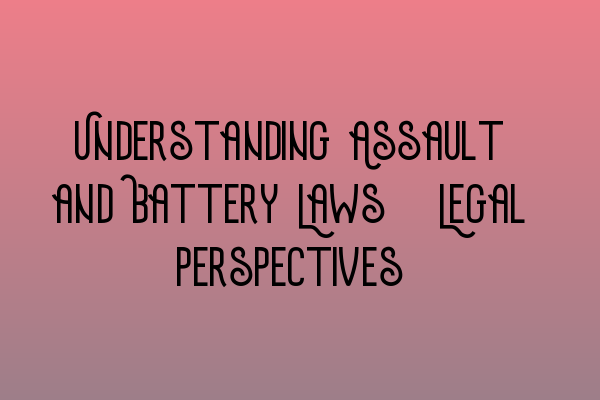Understanding Assault and Battery Laws: Legal Perspectives
Welcome to our blog post on understanding assault and battery laws. In this article, we will provide you with valuable information about assault and battery, their legal definitions, and the potential consequences of these crimes. Whether you are a law student, legal professional, or simply interested in learning more about criminal law, this post aims to shed light on these important legal concepts.
What is Assault?
Assault is generally defined as the intentional act of causing apprehension of harmful or offensive contact with another person. It’s important to note that assault doesn’t require any actual physical contact – it focuses on the fear or threat of harm. To delve deeper into this topic, you can refer to our SQE 1 Practice Exam Questions.
In the United Kingdom, assault is classified into two categories: common assault and aggravated assault. Common assault involves minor physical contact or the threat of physical harm, while aggravated assault generally includes more severe acts of violence. If you want to test your knowledge on assault laws, check out our SQE 1 Practice Mocks FLK1 FLK2 for comprehensive practice.
Understanding Battery
Battery, on the other hand, is the actual physical contact that results in harmful or offensive consequences. It involves the intentional application of force to another person without their consent. Battery is considered a more serious offense than assault, as it usually involves direct harm to the victim. To gain a better understanding of battery laws, we recommend our readers to explore our SQE 2 Preparation Courses.
Legal Consequences
The legal consequences of assault and battery vary depending on the jurisdiction and the severity of the offense. Penalties can range from fines to imprisonment, and in some cases, the court might order the offender to compensate the victim for any resulting physical, emotional, or financial damages. Understanding the potential consequences can help individuals to make informed decisions regarding these matters. For further information on preparing for the SQE 1 exam, please visit our SQE 1 Preparation Courses.
It’s worth noting that assault and battery laws can be complex, and it’s essential to consult a legal professional to fully understand your rights and potential defenses. If you are seeking legal representation, our team of experienced lawyers at SQE Criminal Law & Practice Law UK can provide you with the guidance and support you need. Feel free to reach out to us for a consultation by checking the SRA SQE Exam Dates on our website.
In conclusion, assault and battery are crucial legal concepts that everyone should have a basic understanding of. By familiarizing yourself with the definitions and consequences, you can protect yourself and make informed decisions if faced with such situations. For more resources and information on criminal law, we encourage you to explore our website and take advantage of our comprehensive legal services.
